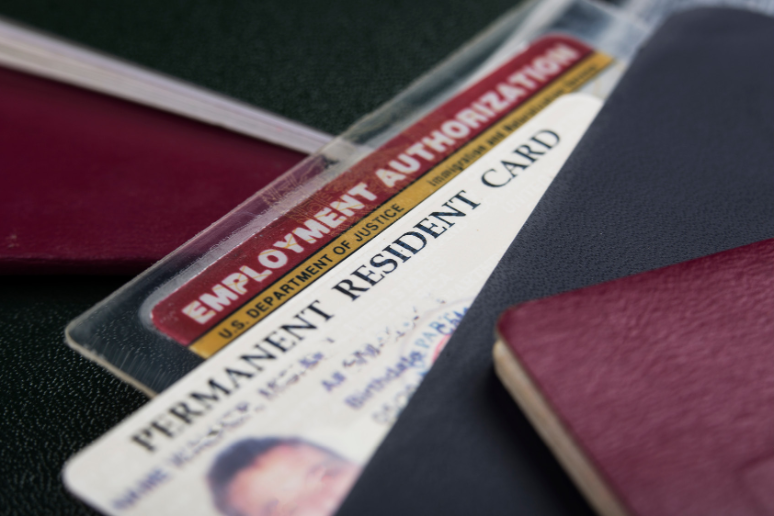If you are not a U.S. citizen and are interested in living and working in the U.S. for the foreseeable future, not a brief period of time, then you need to understand how permanent resident, or a green card, works. While various visas allow you to enter and visit the U.S., and some even allow you to work for a period of time, a green card grants the most freedom and security you can have without becoming a citizen. Read on to learn about your eligibility, the application process, and when to hire an immigration attorney.
Who approves green card petitions?
There are several federal agencies involved in the approval of a green card. U.S. Citizenship and Immigration Services (USCIS) reviews the applications and issues green cards, named in the 1950s for their once distinctive color, although they have not been fully green since the early 1960s; the Federal Bureau of Investigation runs the background checks for green cards; the Bureau of Consular Affairs allocates immigration visa numbers and issues visas for entry into the country; and the Office of Foreign Labor Certification deals with employment-based green cards.
Expect to deal with some or all of these agencies directly during the course of the application process. This will help you stay organized and informed on appropriate channels of communication should any issues arise. The first of these agencies you can expect to encounter will change depending on the route you’ve taken to apply for the green card. If you are applying for an employment-based green card, the Department of Labor will be your starting point.
Basic Requirements for a green card
The basic requirements for a green card include:
- You must fit into an eligibility category defined by the Immigration and Nationality Act for permanent residency. You may or may not be living in the U.S. yet.
- You must have an eligible person able to file a petition seeking your permanent residency status for you. In certain rare cases, a person can self-petition for a green card, if they are able to demonstrate extraordinary ability (like winning an Oscar, Pulitzer, or an Olympic medal), or prove their admittance would be in the national interest of the United States.
- You must be admissible to enter the U.S., which means you can pass a criminal and health check.
- You must obtain or currently have a valid visa for your immediate entry into the U.S.
Eligibility categories for green card recipients
The four main ways to get a green card are through:
- Family
You are an immediate relative (spouse, parent, or sibling) of a U.S. citizen or the spouse or child of a permanent resident, you can apply for a green card. While the children of U.S. citizens typically receive citizenship at birth, they might still need to apply in certain cases like adoption or depending on their birth date. - Employment
An employer can sponsor your green card. The biggest challenge is waiting for an employment visa. The U.S. limits how many are granted every year. U.S. immigration policy used to favor Northern Europeans through a quota system, but the Immigration and Nationality Act of 1965 altered those rules to favor close relatives and employees. - Refugee or Asylum Status
If you fulfill the requirements for being a refugee or asylee or are the spouse or child of a refugee, then you may be able to gain a visa into the U.S. and apply for a green card. - Investment
If you directly invest at least $1 million in a U.S. business or $500,000 in a business in a region that USCIS has designated as needing economic stimulus, then you may be able to obtain an investor visa and apply for permanent residency.
According to the USCIS, there are other categories as well, including if you are a human trafficking or crime victim, a victim of abuse, or you fall into a special immigrant category. Special immigrants include certain religious workers, abandoned, abused, or neglected minors, certain Afghan or Iraqi translators, international broadcasters, or employees of certain international organizations like NATO. You may also participate in the Diversity Immigrant Visa Program, which is a lottery.
An overview of the application process
Once you have determined your eligibility for a green card, you or another person must file the proper form with USCIS. The appropriate form depends on your eligibility category.
After the agency approves the initial immigrant petition and a visa for your eligibility category becomes available, then you may file the next set of paperwork. If you are living in the U.S., this is known as an adjustment of status and you file a form with USCIS. If you are living outside of the U.S. at the time, you must apply for a visa at a U.S. consulate.
Whether you are in the U.S. or another country, you must attend an appointment to have your photo and fingerprints taken and be interviewed.
After your application and background check are processed, you will receive the decision. The length of time this decision process takes depends on the category you fall under. Green cards for immediate relatives of U.S. citizens may take only a few months, whereas other applicants may wait 10 years or more.
When to seek legal assistance
While legal representation is not a requirement in the green card application process, there are certain circumstances in which it is wise to seek the advice of an immigration attorney.
You might have several avenues to take to getting a green card: For example, your employer is willing to sponsor and you are married to a U.S. citizen. An experienced immigration attorney can determine the fastest and most appropriate route to take.
“People think it’s just filling out forms,” Amy Myers, an attorney at the Tedrow and Myers Immigration Law Group, says of the green card application process and how a lawyer may help. “It is, but it’s a lot more than that. And if anybody has any kind of an issue at all, any potential over stay in the past, or they have worked without authorization, or a misdemeanor, they will have to be prepared to deal with that.”
In some circumstances, hiring an immigration attorney is imperative. If you are in the middle of deportation proceedings, for instance, it is absolutely necessary to work with a lawyer as you will be faced with dealing with the courts directly.
Since the green card application process is complicated, bureaucratic, and unforgiving to errors, many individuals opt to work with an immigration lawyer from the onset. An experienced legal professional will know the paperwork, timeline, and process inside and out and will give you the best chance of success in obtaining green card. “What you are getting is an assurance that somebody is really helping you revise things and make sure that you’re answering things correctly,” Myers says. “The service can make all the errors in the world, the applicants can make just about none. They’re not forgiving. If you mistakenly check something you should have checked another way, or provide information that’s not complete, you could be denied.”
The filing fees for green card applications begin at $985 to process Form I-485, with additional fees for other associated forms. An attorney’s fees will vary, but low-cost legal help is also available.
After obtaining a green card
A green card lasts 10 years. You must renew your green card or lose your ability to live and work in the U.S. The fee for processing Form I-90, which you must file to renew or replace your green card, is $540. While you can continue to renew your green card throughout your life, you can also apply for naturalization, which is the pathway to citizenship.
 By Victoria Langley,
By Victoria Langley, 

